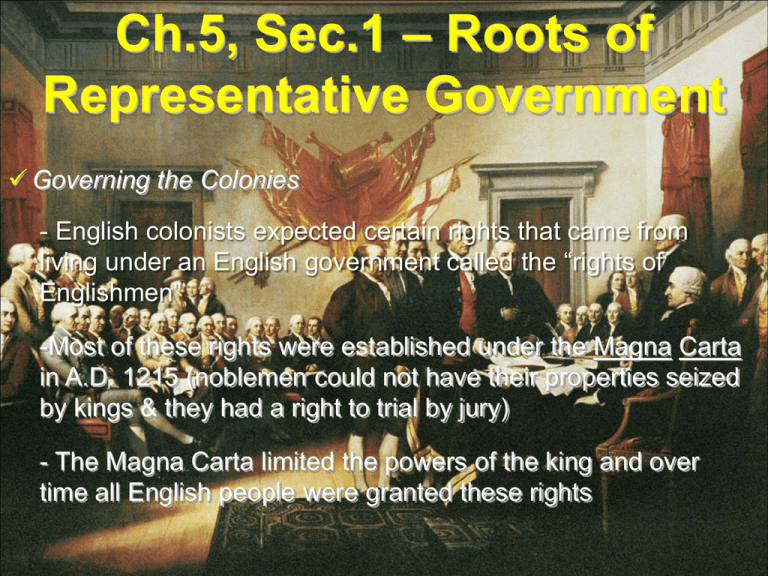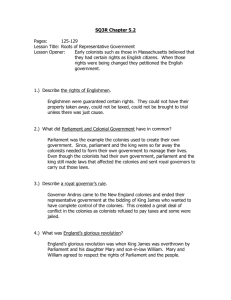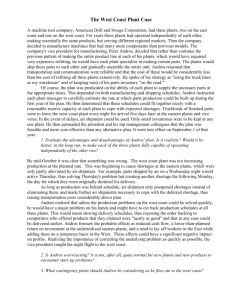Ch.5, Sec.2 – Roots of Representative Government
advertisement

Ch.5, Sec.1 – Roots of Representative Government Governing the Colonies - English colonists expected certain rights that came from living under an English government called the “rights of Englishmen” -Most of these rights were established under the Magna Carta in A.D. 1215 (noblemen could not have their properties seized by kings & they had a right to trial by jury) - The Magna Carta limited the powers of the king and over time all English people were granted these rights Ch.5, Sec.1 – Roots of Representative Government Parliament & Colonial Government - Parliament, England’s chief lawmaking body, was the colonists’ model for representative government - Most colonists wanted a say in the laws governing them, so they formed their own elected assemblies that imposed taxes and managed the colonies (Bi-cameral legislature-law making body made up of The House of Burgess and Council of the State) - The king of England appointed royal governors to rule some of the colonies on his behalf, but the colonists greatly disliked the laws they passed (privy-council-set laws and policies) Ch.5, Sec.1 – Roots of Representative Government The Dominion of New England - Because King James II wanted to rule England and its colonies with total authority, the colonists were no longer allowed to practice self-government (Dominion of New England) - Many colonists had rebelled against the British, especially after the Navigation Acts were implemented, and felt the king had no right to impose laws on them - King James II sent the royal governor, Edmund Andros, to the New England colonies to end their representative assemblies and town governments that had been set up. Ch.5, Sec.1 – Roots of Representative Government - With their assemblies outlawed (Andros), some colonists refused to pay taxes (they felt being taxed without having a voice in government violated their rights) WOULDN’T YOU?? - Fortunately, a revolution in England swept King James II & Governor Andros from power starting “England’s Glorious Revolution” Edmund Andros Ch.5, Sec.1 – Roots of Representative Government England’s Glorious Revolution - In A.D. 1688, the English Parliament overthrew King James for not respecting their Protestant rights, since he was a Catholic - King James’ Protestant daughter, Mary, and her husband, William were offered the crown after King James II fled - This change in leadership was called England’s Glorious Revolution - William & Mary agreed to uphold the English Bill of Rights of 1689, which was an agreement to respect the rights of English Ch.5, Sec.1 – Roots of Representative Government -The king or queen could not cancel laws or impose taxes unless Parliament agreed, which further strengthened the rights of the people - The American colonists quickly claimed these rights, placed Edmund Andros in jail, and asked Parliament to restore their old government Ch.5, Sec.1 – Roots of Representative Government Colonial Government - Colonists regained selfgovernment, but still had to answer to a royal governor - From 1689 – 1753, England interfered very little in colonial affairs, which was a policy called salutary neglect - The colonists got used to acting on their own with very little English interference Ch.5, Sec.1 – Roots of Representative Government The Zenger Trial - Colonists moved toward gaining a new right, freedom of the press, in A.D. 1735 - John Peter Zenger, editor of the New York Weekly Journal, stood trial for printing criticism of New York’s governor - Zenger won his trial (from ury)from his attorney (Remember who?) claiming people had the














